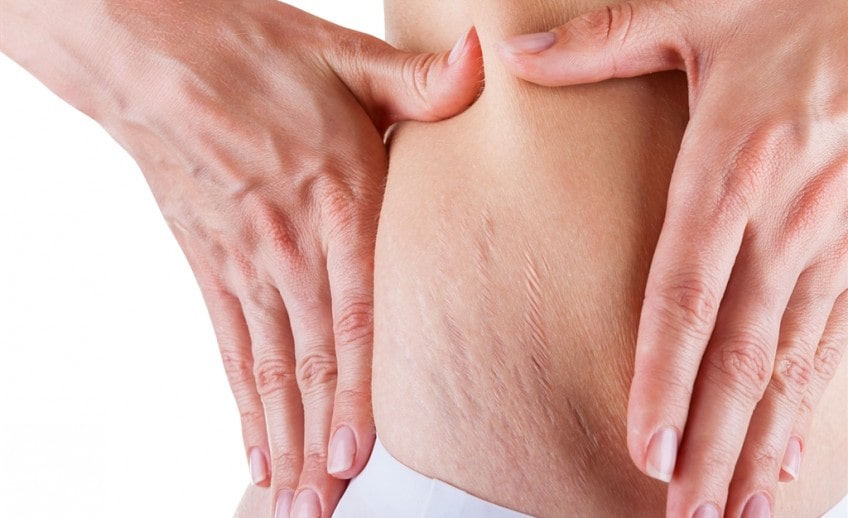Stretch marks are those markings on your body that usually occur during periods of rapid growth, such as puberty or pregnancy. Though they are not limited to only that, they can also appear due to sudden weight gain, weight loss, aging, or even genetics. This skin condition is usually the result of tearing of the dermis. Understandably, the stretch marks in your body can be embarrassing, but laser technology can help to reduce their appearance and promote healthier skin. Stretch marks are those common marks that can affect up to 90% of women during pregnancy. These can also occur in men and adolescents. While these do not pose any danger to your health, still most individuals are looking for the best treatment options such as laser stretch marks removal.
If you are looking for stretch marks treatment you are at the right place. This blog carries significant information taken from Dr. Nivedita Dadu of the Skinology Clinic. The expert doctor is known for the best Stretch Marks Treatment in Delhi so the useful information from her can help you take significant steps towards healthier skin. Thus, let’s first try to understand the different stages of stretch marks.
Stretch Marks: Various Stages
Stretch marks are those thin lines that can appear on the skin, usually around your stomach, breasts, and thighs. Generally, they are the result of rapid weight gain or loss and can be extremely difficult to get rid of.
The stretch marks are caused when the skin is stretched too much and tears in the same process. The collagen in your skin gets broken, and the elastin is damaged. This constant change in your skin results in skin scarring.
- Stretch marks initially start as red lines and evolve, later turning purple and white. The red stage is the earliest of stretch marks. These red marks occur on your skin when the skin is stretched rapidly, for example, during pregnancy. By reaching this stage, these red marks often get itchy and irritated.
- At the purple stage, the stretch marks become more visible and transform from red to purple or blue. The purple stretch marks are considered to be old and appear when the connective tissue beneath the skin tears. It is considered the most difficult stage to deal with, and the stretch marks are more noticeable in this stage.
- The white stage is the final stage of stretch marks; at this stage, they appear to be white or silver. The white stretch marks are the most mature and a result of the breakdown of collagen fibers. They are commonly not as visible as the other stages, but they can still be challenging to tolerate.
Now you know the different stages of stretch marks, let’s cover the laser stretch mark removal technique to fulfill your dream of having stretch-mark free skin.
Laser Stretch Mark Removal Technique: A Brief Understanding
While there is no permanent way to prevent stretch marks from appearing, no stretch mark removal treatments can assure permanent results. Still, laser stretch mark removal can be a great way to reduce the stretch marks appearance to an extent and improve your skin health.
Ideally, laser stretch mark treatments use laser energy to break down the scar tissue that makes up stretch marks and stimulate collagen and elastin production. Not only that, laser light also helps to boost blood flow to the area, which further contributes to less visible stretch marks.
The most common type of stretch removal technique used is:
Scar Treatment laser: To treat stretch marks, Fractional erbium fibre (ResurFX, Lumenis) Laser is used. ResurFX laser uses the “only one pass’’ formula. ResurFX is effective and minimally time-consuming. It is an advanced scanner and a fibre laser of 1565nm. This is a non-invasive process carried out with the help of fractional laser technology. Laser stretch mark removal is a highly recommendable and reliable treatment to reduce stretch marks because it involves less risk and no downtime.
Is Laser Stretch Mark Removal Painful?
If you’re planning to get laser stretch mark removal treatment, you’ll definitely want to know what to expect during the procedure. During the initial consultation, the skin doctor planning your treatment will assess your health and stretch marks to determine the number of sessions and series of treatments you will require. In most of the cases, 4-6 treatment sessions are needed to receive optimal results.
- During the actual procedure performed, the laser technician will clean your treatment area and apply topical numbing cream. Following that, the laser will be used to target the stretch marks.
- Laser stretch mark removal is a non-invasive, FDA-approved procedure. Typically, the procedure is associated with typical or no pain. However, some people have expressed feeling a mild warming sensation when their skin gets exposed to concentrated light rays.
- Since this is an outpatient procedure with almost no downtime, you can return to your normal activities as soon as you leave the doctor’s office.
- Even after the procedure, you can expect some temporary redness. Blistering and swelling in the treatment area. However, you don’t have to feel stressed and nervous when thinking about planning your laser treatment for stretch marks, as these side effects are temporary and resolve on their own within a few days.
- You can also experience a little bit of crusting in the treatment area, which your laser technician will remove before you leave the office.
- For best results, we recommend following your skin doctor’s instructions for post-laser treatment.
Laser Stretch Mark Removal Treatment: Post Instructions
After undergoing laser stretch mark treatment, it is necessary to follow specific instructions to attain positive results in the long run.


